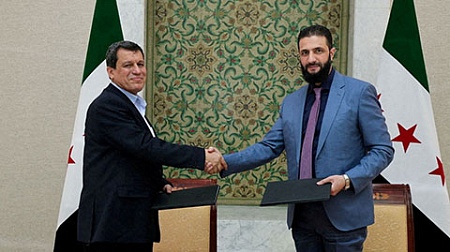
The Syrian Democratic Forces (SDF), a paramilitary alliance dominated by Kurdish formations, has struck a deal with the transitional government in Damascus. The Kurdish command has agreed to integrate its military and civilian structures into government bodies controlled by the central government. The signing of the deal was influenced by signals from the Pentagon that the US contingent would soon leave the zone of influence of the DSS – northeast of Syria (Beyond the Euphrates).
The agreement on the integration of Trans-Euphrates was signed at a meeting between the leader of the DSS Mazlum Abdi and the interim President of Syria, Ahmed al-Sharaa. The Kurdish formations that have created military and political autonomy in northeastern Syria are ready to transfer their civilian and military institutions “to the management of the Syrian state” by the end of the year.
This includes border crossings, airports, and oil and gas fields.
At the same time, the agreement guarantees a ceasefire along the contact lines in the Trans-Euphrates region. Since December 2024, when the government in Damascus collapsed, the SDF has been engaged in intense battles with the Islamist groups that seized power.
The parties agreed to “reject calls for the division of the country, hate speech and attempts to incite contradictions between all components of Syrian society.” The Transitional Government in Damascus has separately committed itself to “guarantee the rights of all Syrians” to representation and participation in the political process, as well as to participate in government “regardless of their religious and ethnic characteristics.” “The Kurdish community is the ancestral community in the Syrian state, and the Syrian state guarantees its right to citizenship and all constitutional rights,” the text of the agreement says.
At the same time, the document stipulates that the DSS formations will support “the Syrian state in the fight against the remnants of the Assad regime and all the challenges that threaten its nation and unity.” Probably, we are talking about the desire of Damascus to completely stop the hotbed of resistance that broke out in the coastal provinces due to the speeches of former supporters of the Assad government and led to large-scale and uncontrolled acts of retaliation by groups close to the transitional government.
According to Syria TV, a channel loyal to Damascus, the deal between the Syrian transitional government and the SDF was finalized after “signals were received from American troops stationed in the Euphrates region about the intention” of the administration of US President Donald Trump to withdraw the contingent “in the near future.” He had similar ideas during his first term as president, but then the American generals managed to persuade the head of the White House to keep a limited number of fighters in this part of Syria beyond the control of the central government. Now the United States, Syria TV draws attention to, has pushed Abdi to reach a compromise solution.
In these months, there have already been signs of limited agreements between the DSS and Damascus. They concerned the economic sphere. According to Ahmed al-Suleiman, an official representative of the Syrian Ministry of Oil and Mineral Resources, the transitional government recently received the first official supplies of oil and gas from Northeastern Syria. “The resumption of oil and natural gas exports from the northeast of Syria took place in accordance with the contract that was concluded earlier,” he explained. – It has been legally studied, the necessary amendments have been made to it.”
A Reuters source in the DSS clarified at the time that the deal, in its current form, provides for the shipment of 5,000 barrels of crude oil daily to the transitional government. Now, Damascus is likely to gain wider access to hydrocarbons, which are critically important for the recovery of the national economy.
According to the American Institute for the Study of War (ISW), last week’s massacre in western Syria probably influenced the conclusion of an agreement between the Transitional Government and the SDF. “At the moment, it remains unclear which side has made concessions regarding the terms of military integration,” the American researchers note. In January 2025, in an ultimatum, Damascus demanded that the DSS completely disband its formations. In his opinion, the alliance fighters should have joined the Ministry of Defense of the interim government as individuals, and not as members of an autonomous bloc.
According to ISW estimates, the formation of the DSS could effectively help Damascus mitigate problems with the pockets of influence of former supporters of Bashar al-Assad.
“The rebellion and the harsh retaliatory actions of the interim government probably reinforced the conviction of the leaders of the DSS that the organization should retain some forces capable of protecting the Kurdish population from ethnic and religious violence,” the American researchers note. “In the past, the Syrian Interim Government has not given guarantees to the SDF that it will protect the territory of the alliance and the Syrian Kurds during the period of the SDF’s integration into the interim government.” It is possible that the agreement concluded by Abdi and al-Sharaa is aimed at alleviating many of the concerns of the Kurdish commanders, the ISW concludes.
